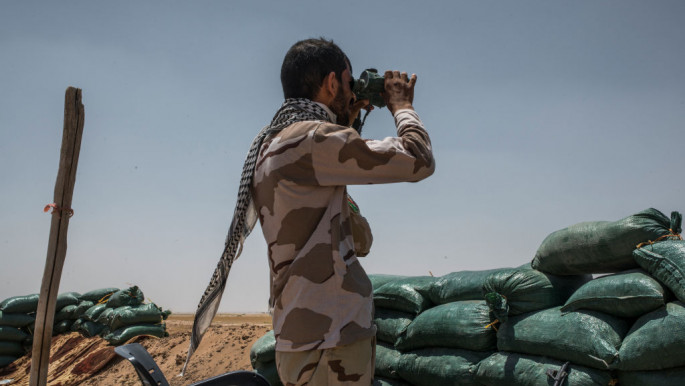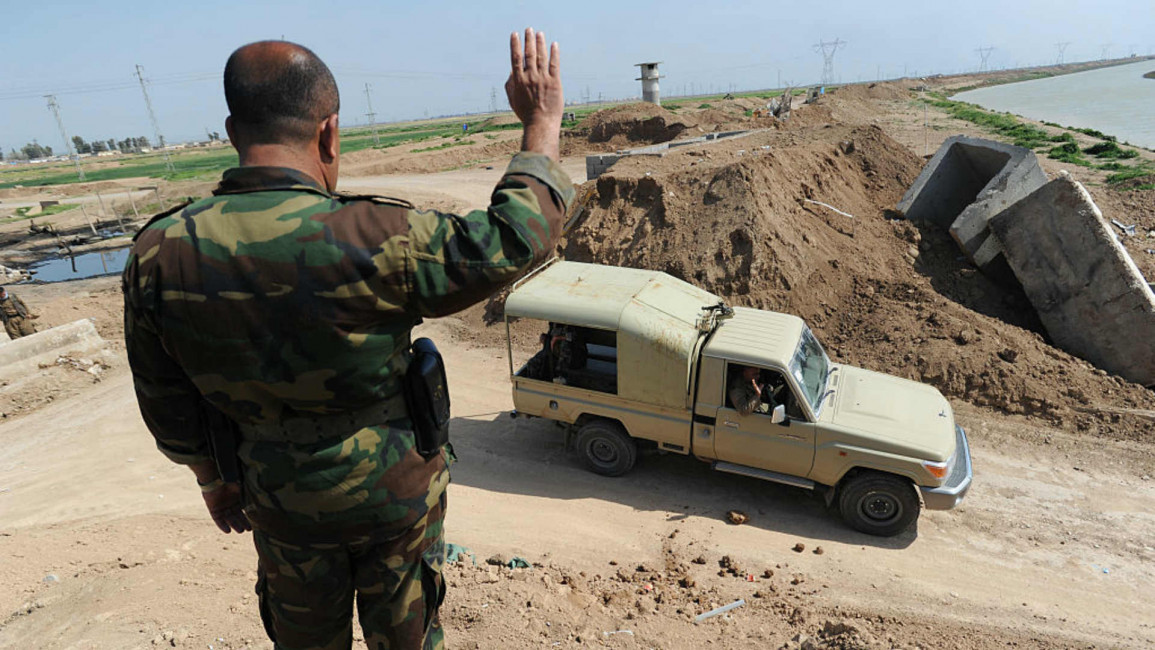
Iraqi-Kurdish cooperation in Kirkuk is vital for defeating Islamic State
In a report for the Center for Strategic and International Studies (CSIS), Maxwell B. Markusen argues that the United States needs to push Baghdad and Iraqi Kurdistan to once again begin joint patrols in Kirkuk, the main territory they both dispute the status of.
"While the ISF and Peshmerga have been separately conducting limited numbers of successful patrols in rural parts of provinces formerly held by the Islamic State, including Nineveh and Kirkuk, there still have been no joint patrols since the Kurdish referendum in 2017," he writes.
Before the ISF and the Iraqi state-sanctioned Shia-majority Popular Mobilisation Forces (PMF) paramilitaries seized Kirkuk from the Kurds in October 16, 2017 the ISF and Peshmerga had undergone "historic" cooperation against IS in the early stages of the battle for Mosul - in which the Peshmerga secured all the major routes into Iraq's second city for the ISF.
Iraq's military takeover of Kirkuk brought this to an end. Baghdad went from productively working with the Peshmerga against a common enemy to engaging in skirmishes against them, constituting the first time Kurdish and Iraqi forces shot each other since the Saddam Hussein-era.
There was certainly never a worse moment in post-Saddam relations between Iraq and Kurdistan.
 |
The Peshmerga and Kurdish security forces proved very adept at counter-terrorism |  |
Baghdad justified its takeover of Kirkuk as a response to the Kurdistan independence referendum back in September 25, 2017, in which Kirkuk also participated, though this is unlikely to have been the case. Before the date for the referendum was even announced, in July 2017, the Kurdish Peshmerga in Kirkuk were warning of a suspicious PMF build-up as early as the previous February, worried they were preparing to target them.
Also, Iraq would never have welcomed the indefinite continuation of a status quo in which the Kurds had complete control over Kirkuk, which only happened because the Iraqi Army abandoned the entire province in June 2014 as IS swiftly overran the north of the country.
It's also important to remember the fact that the referendum was a local poll on whether or not Kurds want independence from Iraq, and not a declaration of independence. Baghdad responded as if it were, closing the region's airports and hinting it would dismantle the region's hard-won three decades of autonomy.
Read more: Iraq elects Kurdish moderate president, designates new prime minister
The October clashes verifiably empowered IS. The group has exploited the gaps created by ISF and Peshmerga clashes and the continued lack of coordination between them since that time.
It retains a sizeable presence in Kirkuk and has waged dozens of "unabated" attacks in recent months, ranging from use of lethal suicide vehicle-borne explosive devices (VBIEDs) to assassinating dozens of village leaders, moqtars, as part of its strategy to systematically undermine local confidence in the state security forces. IS attacks, Markusen noted, have "more than doubled in Kirkuk province from 2017 to 2018."
Lack of ISF-Peshmerga coordination only benefits IS
"Understandably, there are political sensitivities to having the Peshmerga redeploy to Kirkuk, but the alternative is a security vacuum or relying on sectarian militias to patrol Kirkuk, is inviable," Markusen wrote.
"Baghdad must recognise that a multiethnic joint security force of Peshmerga and ISF components would be much more effective at disrupting Islamic State activity than the PMF," he added.
This would doubtless prove true if the last two years alone are anything to go by. The PMFs displaced thousands of Kurds during the October 2017 events, particularly in the ethnically-diverse town of Tuz Khurmatu where they attacked Kurdish homes.
The chaos created by needlessly inflaming underlying communal tensions is a recipe for generating the kind of destabilising bloodletting IS has successfully exploited to its advantage in the past.
 |
|
| An Iraqi PMF fighter looks to the Iraq-Syria border in Nineveh, Iraq, June, 2017 [Getty] |
Furthermore, the PMFs did not even prove very effective against IS. While they held the line in southern Iraq initially in the summer of 2014 after the Iraqi army fled IS' rapid advances in the north, their offensive operations - especially ones they attempted to execute single-handedly - left a lot to be desired.
Case in point was the battle for the tiny Shia Turkmen town of Bashir in Kirkuk province back in May 2016. Occupied by IS the Hashd besieged it for months on end but failed to retake it, suffering significant casualties in the meantime. After they finally agreed to work with the Peshmerga the town was cleared in less than a week with US air support.
When they were in full control of Kirkuk the Peshmerga and Kurdish security forces proved very adept at counter-terrorism, as exemplified by their successful foiling of a sophisticated coordinated IS takeover attempt of the city in October 2016.
 |
To make the most out of this more productive atmosphere the two sides need to formulate a roadmap for security cooperation in Kirkuk |  |
The Kurds are also more familiar with Kirkuk than the ISF-PMF. It's true a lot of the younger generation Peshmerga don't speak Arabic and have consequently encountered difficulties in Arab parts of the area. But generally, in that Sunni-majority province, they are a hugely less divisive force than Shia militiamen.
Also, according to Kirkuk's former governor Najmaldin Karim, whom Baghdad ousted during last year's takeover, the majority of IS members in Kirkuk come from the local population, a fact that needs to be taken into account for future counter-terrorism operations in that key region.
The counterproductive and nonsensical fighting between the PMF and Peshmerga last autumn is now thankfully relegated to the past with very little chance of clashes reigniting.
Twitter Post
|
Masoud Barzani, Kurdistan's former president and chief champion of the independence referendum last year visited Baghdad this November to meet Iraq's new prime minister, Adil Abdul Mahdi. The trip was very cordial with Abdul Mahdi warmly welcoming Barzani, a far cry from last year when Abdul Mahdi's predecessor contemplated issuing an arrest warrant for the Kurdish leader.
Abdul Mahdi previously lived in Iraqi Kurdistan during the Saddam Hussein years and likely understands Kurds and the Kurdish question much more than his predecessor. Barzani said as much of him following their fruitful meeting.
Barzani also met the leader of the Badr Organisation Hadi al-Amiri, whose Hashd fought the Peshmerga last year and participated in the takeover of Kirkuk. Amiri chose to highlight the fact that both groups "fought IS together" and are now "forging a strong partnership."
In other encouraging news, Washington has successfully compelled both Baghdad and the Kurdish government in Erbil to reach a deal over the continuation of oil exports from Kirkuk.
All of the oil pipelines that export Kirkuk's oil to the Turkish port of Ceyhan run through Iraqi Kurdistan. So low were relations with Kurdistan during former Prime Minister Haider al-Abadi's last year in office, that Baghdad lost as much as $5 billion in oil sales - at a time when it needs billions to reconstruct large parts of the country destroyed in the IS war - because it did not want to make a deal with Erbil.
To pump that $5 billion through the Kurdish pipelines would have only netted Kurdistan's private sector a comparably puny $200 to $250 million.
This is all changing for the better under Abdul Mahdi's new government. Kurds can continue exporting oil from fields within Iraqi Kurdistan independently of Baghdad - an issue that previously caused tensions resulting in Baghdad withholding the Kurds' share of the federal budget in early 2014. This in turn contributed to the financial crisis the region has suffered from in recent years, but it is now seeing much needed cash to pay civil service employee's salaries and large debts to foreign oil companies.
All this bodes well for at least the short-term future of relations. To make the most out of this more productive atmosphere the two sides need to formulate a roadmap for security cooperation in Kirkuk, a region of pivotal importance, and the rest of the disputed territories as soon as possible.
 |
The counterproductive and nonsensical fighting between the PMF and Peshmerga last autumn is now thankfully relegated to the past |  |
Barzani recently pointed out that IS' military defeat in Iraq and its reversion to its roots as a lethal non-state actor makes it much harder to combat.
"Then, [IS] was on the ground, now, they are underground. Daesh has returned to a lot of the areas much worse than before," Barzani explained, using the Arabic acronym for the group.
The Kurdish leader cited Diyala, Nineveh and Saladin provinces as examples of areas on which the group are continually waging attacks. Unless effectively dealt with the group, or an even worse organisation, could reemerge, Barzani warned.
Consequently, just as it successfully pushed for restarting cooperation on oil exports between Baghdad and Erbil, Washington now needs to strongly push for successful security cooperation to prevent such a disastrous outcome.
Arguably, the United States has more responsibility here since it failed to intervene decisively to stop the confrontation over Kirkuk last year.
"The United States was slow to react and did not react muscularly enough, despite having military forces near Kirkuk," Iraq analyst Michael Knights recently noted. "These forces' very presence could have acted as an interposing 'trip-wire' and stopped the crisis cold."
Today, to at least partially rectify this failure and the setbacks it caused to the crucially important campaign against IS, the US should push for joint patrols and the beginning of a political settlement over the status of Kirkuk, and all the other disputed territories between Baghdad and Erbil, in order to prevent these flashpoints from flaring up once again and benefitting tyrannical groups such as IS.
Paul Iddon is a freelance journalist based in Erbil, Iraqi Kurdistan, who writes about Middle East affairs.
Follow him on Twitter: @pauliddon
Opinions expressed in this article remain those of the author and do not necessarily represent those of The New Arab, al-Araby al-Jadeed, its editorial board or staff.


![President Pezeshkian has denounced Israel's attacks on Lebanon [Getty]](/sites/default/files/styles/image_684x385/public/2173482924.jpeg?h=a5f2f23a&itok=q3evVtko)



 Follow the Middle East's top stories in English at The New Arab on Google News
Follow the Middle East's top stories in English at The New Arab on Google News


